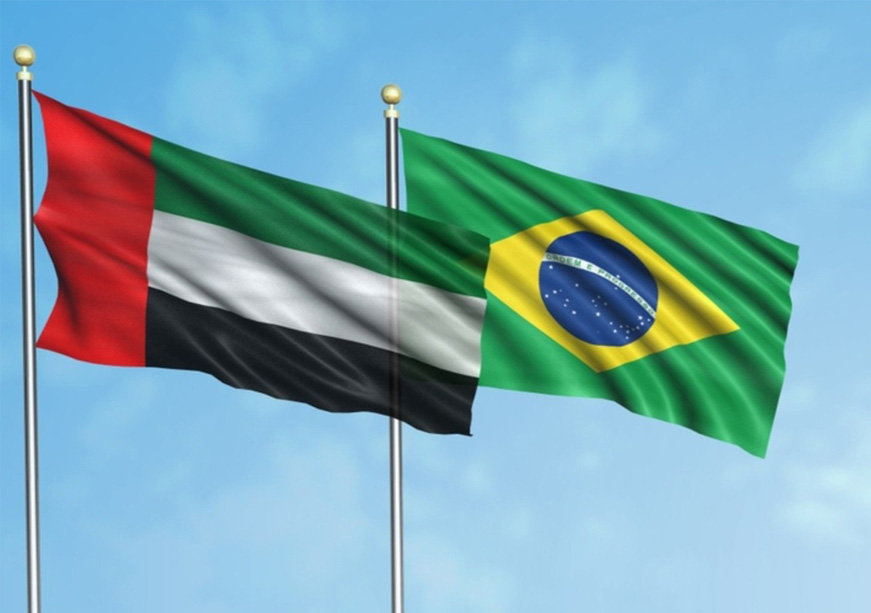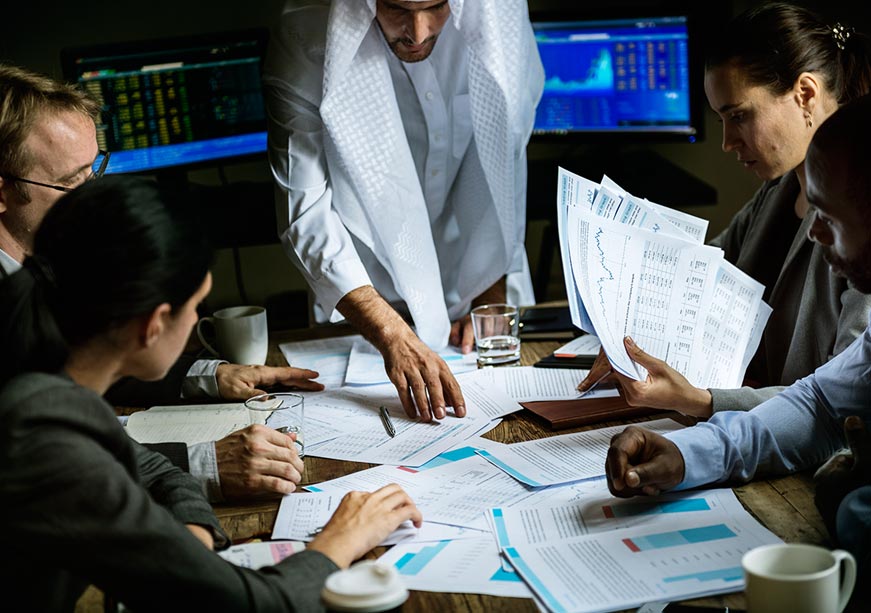Brazil and the United Arab Emirates (UAE) may seem like unlikely partners as they differ culturally and geographically, with the former home to a third of the world’s remaining tropical rainforests and the latter dominated by arid deserts. Despite their differences, both grapple with mounting climate pressures: Brazil is witnessing drying rivers and forest loss, while the UAE is battling heat stress and infrastructure vulnerabilities.
In 2024, the two countries marked 50 years of diplomatic relations, commemorating a strategic relationship that now extends to agribusiness, infrastructure, and technology. The UAE has since become Brazil’s largest trading partner in the Middle East, with bilateral trade exceeding US$4.3 billion and Emirati investments in Brazil surpassing US$5 billion in 2024.
Economic ties are strengthening as both seek to diversify partners amidst the US tariff announcements by Trump. The UAE and MERCOSUR are actively negotiating a Comprehensive Economic Partnership Agreement (CEPA) to expand trade and investment. Brazil also removed the UAE from its list of jurisdictions with preferential tax regimes. At the 17th BRICS Summit in July 2025, two signed a Memorandum of Understanding (MoU) to launch a US$100 billion development investment fund between the Abu Dhabi Investment Group and Banco do Brasil S.A. for agriculture, environment, and infrastructure development.
The Rationale Behind UAE-Brazil Climate Cooperation
The UAE is emerging as a finance, innovation, and climate action leader, driven by an internal pressure to enhance food and water security. This complements Brazil’s efforts on forest conservation and sustainable agriculture. Although Brazil can easily access funding from institutions like the Inter-American Development Bank (IDB) or the World Bank, a UAE partnership offers distinct advantages: faster capital deployment, reduced bureaucratic barriers, and trade connectivity between the West and the East. In turn, Brazil offers the UAE a strategic entry point to Latin America with significant investment potential.
The two nations are also amplifying their presence on the global stage through platforms like COP, the G20, and BRICS+. Both have exhibited a strong commitment to addressing the climate crisis through bilateral and multilateral cooperation as COP hosts. At COP28, the UAE positioned itself as a bridge between Global South and Global North voices, while acting as a mediator between hard-to-abate sector representatives and clean energy experts. At COP30, Brazil aims to spotlight indigenous populations, while emphasising implementation and innovation.
With aligned climate priorities, favourable economic conditions, and complementary strengths, the UAE and Brazil are well-positioned to deepen bilateral climate cooperation beyond transactional partnerships towards co-creation, joint innovation, and building long-term frameworks that serve each other’s strategic interests. By leveraging South-South mechanisms, the two nations can drive climate finance flows and forge collaborative partnerships in agriculture and food security.
Avenues to Strengthen Climate Cooperation
- Mobilising Climate Finance via Financial Instruments:
A core opportunity lies in leveraging multilateral mechanisms to channel climate finance into underfunded areas, such as protecting Brazil’s forests, which are critical in preventing greenhouse gas emissions. More than 50 percent of international climate finance in Brazil is directed towards the energy sector, with only 11 percent allocated for Agriculture, Forestry, Other Land Use, and Fisheries (AFOLU). The UAE can serve as a reliable partner to meet Brazil’s reforestation funding needs through existing mechanisms such as REDD+ and carbon markets. Although carbon markets have been riddled with challenges, effective collaboration to successfully harness their potential in Brazil would yield two key benefits: It would help the UAE offset emissions from hard-to-abate sectors, while enabling reforestation.
The UAE’s Federal Decree on climate change encourages participation in carbon credit markets to support national decarbonisation. While the UAE has piloted investments in voluntary REDD+ projects in Brazil’s Acre and Amazon regions, it has yet todevelop its own regulated carbon trading infrastructure. The UAE’s voluntary carbon exchange scaled down operations within a year due to operational challenges. Brazil, on the other hand, has approved its first national regulated carbon market in South America, creating a framework for scaled emissions trading. Brazil’s approach distinguishes between regulated and voluntary sectors and is designed to be compatible with international systems such as the EU Emissions Trading System. The UAE can gain valuable insights if it seeks to develop its own regulatory framework, potentially through a cap-and-trade model, which would be politically feasible and economically strategic.
Despite progress in forest investments, there is ample opportunity to improve the socio-ecological integrity of REDD+ and broader carbon markets. Some UAE-backed investments in Brazil have encountered challenges in achieving forest restoration goals. Advances in monitoring, reporting, and verification technologies, as well as Articles 6.2 and 6.4 of the Paris Agreement, provide an opportunity to strengthen standards and rebuild the credibility of carbon credit markets. Together, the two can leverage their leadership at global forums to advance transparency and accountability across global carbon markets.
Though fairly nascent, biodiversity credits and the Tropical Forest Forever Facility (TFFF) offer emerging opportunities for the UAE to support Brazil’s forest conservation efforts.
Biodiversity credits are an underutilised financial instrument. Unlike carbon offsets, which often allow continued emissions from high-polluting sectors, the biodiversity credits fund reforestation through nature-based solutions, which governments and companies can purchase to meet their own biodiversity commitments. While measuring biodiversity remains complex, these credits provide a hopeful alternative, and COP30 can be a platform to streamline metrics.
Another alternative is the novel TFFF mechanism, which will be launched at COP30 and has been backed by the UAE. Modelled after a sovereign wealth fund, TFFF aims to incentivise long-term adaptation for tropical forest countries while generating returns on investments for sponsors such as the UAE.
- Mobilising Climate Finance via South-South Banking
The UAE can supplement its bilateral contributions by employing multilateral South-South mechanisms to help de-risk investments.
The New Development Bank has committed to directing 40 percent of its financing to climate change projects from 2022 to 2026. Climate investments currently total around US$40 billion, of which nearly 16 percent will fund projects in Brazil. The scale of NDB’s climate commitments remains modest in comparison to other banks, such as the World Bank and Asian Infrastructure Investment Bank (AIIB), despite appealing distinctions like its emphasis on local currency transactions and non-sovereign lending. Though the UAE’s NDB contributions have historically been geared towards financing green projects for its MENA counterparts, Brazil offers untapped yet attractive financial returns for Emirati and sovereign investors, especially in sustainable infrastructure, transportation, and logistics systems. Liaising with regional banks such as the IDB or developing a risk mitigation facility for international finance managed by NDB would further enable investment viability.
- Building Climate-Resilient Food Systems
The UAE and Brazil both aim to strengthen domestic sustainable agriculture, with the UAE leveraging controlled-environment agriculture to localise and increase domestic food production to 50 percent and Brazil advancing regenerative agriculture to cope with degraded land. Both are also diversifying and reinforcing their food supply chains, with the UAE for import purposes and Brazil for export purposes. Thus, there is unharnessed potential beyond transactional partnerships for joint ventures in agricultural innovations and resilient food chains.
The foundation for UAE-Brazil resilient agriculture cooperation already exists. Abu Dhabi Investment Group and Brasilinvest are set to invest US$10 billion in Brazilian agribusiness projects focused on agricultural transportation, storage, and clean energy generation systems. Erth Zayed Philanthropies also committed US$40 million to back Brazilian projects, a portion of which will be directed towards sustainable farming.
Knowledge exchange forums would help in 2 ways: 1) testing emerging technologies and 2) conceptualising governing frameworks. The UAE is pioneering agri-technology and research and development to boost production efficiency, such as the use of biochar to improve water-use and sequester carbon. Brazil, which has seen biochar’s potential for land restoration in pilot studies, could benefit from UAE support to scale these efforts. Further, Brazil’s budding local food production and experience in scaling community-based agricultural models offer lessons for the UAE as it seeks to empower local producers, and vice versa. For example, Brazil’s Feeding Cities Strategy specifically includes an Urban Agriculture Programme and delineates approaches to strengthen regulatory frameworks, areas where the UAE still faces challenges in integrating urban food systems into larger urban plans.
The UAE can not only provide financial capital, but also a hub to catalyse Brazil’s trade and sustainable agriculture innovation. The UAE imports 80 percent of its total food supply, and halal meat and poultry comprise Brazil’s top exports to the UAE. A UAE-MERCOSUR CEPA could enhance Brazil’s access to the UAE’s special economic zones, opening new export routes to Asian markets. Brazil is also constructing a new logistics hub in Santos to boost exports to the Middle East. Similarly, ongoing Brazilian agribusiness delegations to the UAE offer pathways to unlock Emirati capital for sustainable agriculture and cooperation on food safety. Looking ahead, the UAE and Brazil can consider formulating a solidified trade corridor between Brazil, the UAE, and Asia, similar to that of the UAE-Africa-India.
For Brazil, food logistics investments fall behind the pace of food production due to storage and process efficiency challenges. Conversely, the UAE has notably advanced in its smart storage technologies and food logistics processes. UAE investments or technical assistance could help support Brazil in closing its infrastructure development and regulatory reform gaps.
Given ongoing and forthcoming economic partnerships, the UAE and Brazil have new opportunities to take their climate cooperation to the next level. Through South-South finance, the two can strengthen environmental protection and the regulatory landscape governing carbon markets. Likewise, by collaborating to advance sustainable agriculture production and resilient supply chains, the UAE and Brazil can strengthen food security and expand international trade connectivity.
Leigh Mante is a Junior Fellow, Climate and Energy at ORF Middle East.











